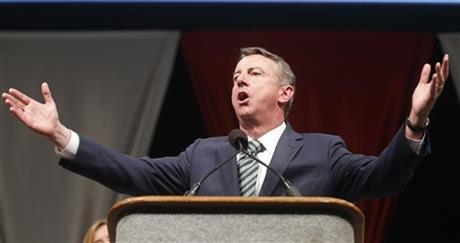
Democratic Sen. Mark Warner’s apparent victory leaves Virginia very much a purple state, with just enough Libertarians to change the hue from election to election.
If Republicans were enthused by Ed Gillespie’s better-than-expected performance, GOP leaders may be kicking themselves in hindsight.
“If there’s one regret, it’s that they didn’t spend enough here,” University of Mary Washington political science professor Steve Farnsworth said.
Outspent by nearly 4-to-1, Gillespie put himself into the conversation for future campaigns.
“One thing is certain: Ed Gillespie’s stunning performance — almost upsetting the most popular politician in Virginia — has launched him to stardom among Virginia’s Republicans. Expect to see him back on the ballot, soon,” predicted Ron Meyer, a leader of the Fairfax Young Republicans.
Could be. Warner’s first run, a close contest with Republican John Warner, helped catapult him into office later.
Farnsworth was more cautious about the GOP’s prospects in 2016.
“This election showed the level of antipathy to the Obama presidency,” he said. With Obama running out his eight years in office, and a typically higher Democratic turnout expected, another blue tide could wash over Virginia, as happened in 2008.
“Comstock’s victory will be pivotal in rebuilding the party’s Northern Virginia brand. She will be much more active in trying to get down-ballot Republicans elected to build a base for 2016,” said Meyer, who heads Springboard Media Strategies.Meyer said newly elected Republican Rep. Barbara Comstock could staunch the flood in Northern Virginia.
Meyer said the state delegate from McLean outperformed every Republican candidate in Northern Virginia since Bob McDonnell’s 2009 landslide.
“She understands how to win. She will be a game-changer for 2015, 2016 and beyond,” Meyer said.
Going forward, a wild card could be the Libertarian Party. LP candidate Robert Sarvis garnered 2.4 percent of the vote in the Senate race — more than enough to cover Warner’s apparent victory margin.
An exit poll showed that 11 percent of 18- to 29-year-olds voted for Sarvis, far more than any age group.
Prior to the election, one poll showed millennials preferred Sarvis to Gillespie by more than 2-to-1. Warner lost ground with younger voters, receiving 50 percent of their support, down from 71 percent in 2008, according to civicyouth.org.
Kenric Ward is a national correspondent for Watchdog.org and chief of its Virginia Bureau. Contact him at [email protected]
Katie Watson contributed to this story.

